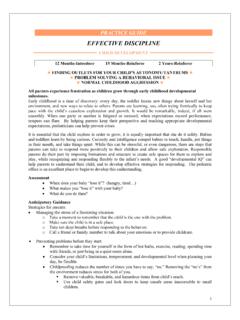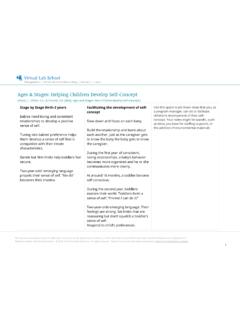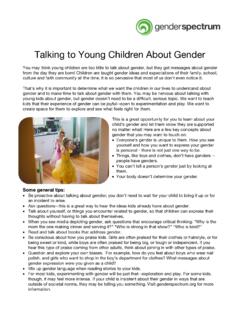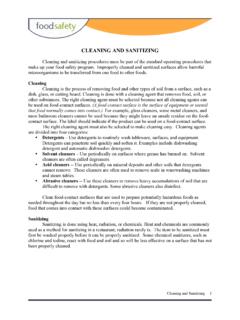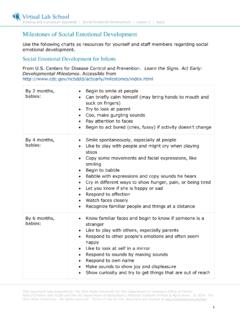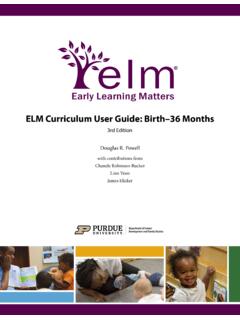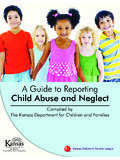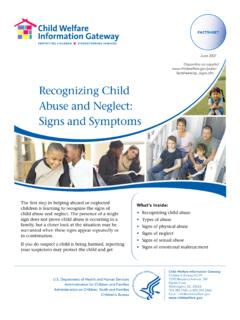Transcription of Recognizing Child Abuse and Neglect: Scenario Cards
1 Training and Curriculum Specialist | Child Abuse Identification and Reporting | Lesson 2 | Apply This document was prepared by The Ohio State University for the Department of Defense's Office of Family Policy/Children and Youth and the US Department of Agriculture's National Institute of Food & Agriculture. 2013 The Ohio State University. All rights reserved. Terms of use for this document are located at 1 Recognizing Child Abuse and neglect : Scenario Cards You can use these Scenario Cards to do quick booster sessions with staff about Recognizing Child Abuse and neglect .
2 Read a Scenario with staff members and take the time to identify the signs that might be indicative of Child Abuse or neglect . Talk with staff members about what they might do in each situation. In the left column, you will find scenarios. In the right column, you will find answers. To use these Cards , you can cut each pair ( Scenario and answer) apart from the other pairs. Then fold along the middle line. This will create a front-and-back card you can use. Channing s dad never has much to say when he comes to the program. He seems very guarded and private. When you ask the children to bring in pictures from home for a project, Channing s dad gets very upset that you are violating the family s privacy.
3 Channing says he is not allowed to work on the project or talk about his family. You can and should respect a family s right to privacy. If they don t want to share information, that is OK. You should always continue to monitor the well-being of all your children, though. Being secretive or unduly protective of a Child can be a sign of Abuse . Watch for other signs and make a report if you suspect maltreatment. Violet, age 11, is having a hard time walking. When she sits down, she acts like it hurts. You ask her what is wrong. She just looks down and says, Nothing.
4 A few days later, she is playing soccer with the other children. She rolls up her pant legs stretches on the ground when she gets warm. You notice dark purple bruises on her inner thighs. She seems to remember the bruises are there and rolls the pant legs back down below her knees. Violet might have been the victim of sexual Abuse . Pain or difficulty walking or sitting is a warning sign of this type of Abuse . Do not question the Child further; sexual Abuse is a very sensitive topic and is best left to a trained counselor and the investigators. Simply document what you have seen and report your suspicions right away.
5 Training and Curriculum Specialist | Child Abuse Identification and Reporting | Lesson 2 | Apply This document was prepared by The Ohio State University for the Department of Defense's Office of Family Policy/Children and Youth and the US Department of Agriculture's National Institute of Food & Agriculture. 2013 The Ohio State University. All rights reserved. Terms of use for this document are located at 2 Edgar has always been a little dad. He seems to take care of other children. You have noticed that he always seems especially concerned about his three younger siblings.
6 Today you caught him stuffing extra snack in his pocket. He said he needed to take it home for his brothers and sisters. Edgar seems to be taking on a parenting role for his younger siblings. Continue to monitor, but this could be an early warning sign of Child neglect . Bryce has been out of the program for a few days. His parents had called in to report him sick. On his first day back, though, you notice fading bruises on various parts of his body. Bryce s bruises could be a sign of physical Abuse . Absences from the program and physical injuries should be documented and reported.
7 Cecelia s mom drops her off and says, You better stop being evil today. I swear you are no good, and I wish I did not even have to pick you back up. Cecelia s mom is talking very negatively of her. She is belittling and critical. These are signs of emotional Abuse and should be reported. Quentin, age 9, comes to the program with a can of beer in his backpack. Alcohol or substance-use in children can be a sign of neglect . Work with management and the program staff. Ask Quentin and his parents about the alcohol. Continue to monitor the situation. Camron (age 6) is very loved by his mother.
8 She holds him for several minutes before leaving him at the before-school program. She tells him, I don t know what I would do without you. You are my best friend. It is you and me against the world, kid. This could be a sign that Camron s mother is using him to meet her own emotional needs. Continue monitoring the situation and provide social supports to Camron and his mother. Training and Curriculum Specialist | Child Abuse Identification and Reporting | Lesson 2 | Apply This document was prepared by The Ohio State University for the Department of Defense's Office of Family Policy/Children and Youth and the US Department of Agriculture's National Institute of Food & Agriculture.
9 2013 The Ohio State University. All rights reserved. Terms of use for this document are located at 3 Alecia, age 6 months, has had a severe cough for at least two weeks. It has gotten so bad that her whole body seems to seize up when she coughs. She wheezes and seems exhausted. You are very concerned about her health and have expressed your concerns to her mom. Mom just keeps saying, It s getting better. The doctor will just tell me it s a cold and there s nothing they can do. It s a waste of time. Alecia may be experiencing medical neglect . Alecia s mother does not seem to be providing necessary medical care despite the financial means to do so.
10 Document what you have observed and make a report.
